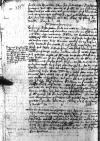Bisher seindt uns nichts von zeitungen, widde[r] von hofe, noch aus anderen orternn, / die wir Ewer Herlichkeit vor dismol hetten mugen mitteilenn, / zukommen. Was uns aber hernacher / auf unser negstes ⌊⌋ bei unserm alten diner ⌊Mauritio⌋, / worauf wir teglich antwurt wartende sein, / / so wol von unser angesatzten botschaft und ihrer boherbergung, / auch was dem hern culmeschen underkemerer ⌊Fabian Czemen⌋ / bei der ⌊jungen koninglichen majestet⌋ / vor ihrem einnzuge zu ⌊Pieterkow⌋ von der ⌊hern redte⌋ wegen auszurichten auferlegt worden, / als sunst anderen zeitungen wirdt eingebracht werden, / wollen wir, / so balde solchs a[n] uns gelanget , / Ewer Herlichkeit nicht vorhaltenn, von der uns auch vor etzlichenn tagen ⌊⌋ neben einer ... copien des vortrags uber das schloss ⌊Reden⌋ ist uberantwurt worden, / woraus wir bofinden, / das die ihenigenn, / so das d... zu sich zu losen sich understhen und bodocht sein, / widder den vortrag wenig schaffen mugen. / Ess were den, das dersul[be] durch den hern wojwoden und sein tochter gebrochenn und nicht gehaltenn wurde, / darum wir vor notig achten, das man die, so ess angh[et], hirin vorwarne. ⌊Absolonn R[ei]man⌋ haben wir zu den funfzig gulden, / die ehr von Ewer Herlichkeit entfangen, / noch funfzig geben lassen. / Vorshen uns ehr dam[it] genugsam vorgnuget sei, / das ehr im schaden nicht bleiben werde. Wie des wirdigen hern ⌊Johanni Lobowitz⌋, unser kirchen thum hern, sachen wegen sein {canocats} sthen, / wirdt ehr Ewer Herlichkeit genugsam borichtenn, / den wir bisher aufgehalten, / und gerne bei uns gehabt, / dam[it] wir in desto bass furderen kundtenn, / an welchem unsrem fleis im auch noch vorthin nichts sol abghen. Den Ewer [Herlichkeit] und alle, die dersulben vorwant und zugethonn sein, / zufu[r]derenn, / wollen wir stets willig bofundenn werden, / da... Ewer Herlichkeit gewisse sich zu{n} uns zuvorshen haben, die wir mit langweriger gesuntheit und geluckseligem volghen gotlichen genaden bovelenn.
